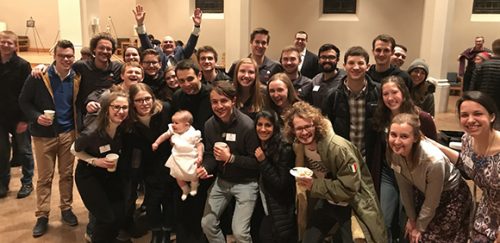MY DAUGHTER JOSEPHINE smiled ear to ear and giggled through the entirety of her baptism last January. As I held her, she gleefully wiggled her arms and legs, and I rejoiced.

Josephine was surrounded by 400 college students with whom my husband and I work at St. John’s University and the College of St. Benedict. There was a big party afterward with cake and hot cocoa in the Great Hall. Our parents and siblings all arrived by airplane from New York, Louisville, Dayton and Huntsville to enter the sub-zero temperatures and join us for the sacrament. The photos show large groups of happy students embracing Josephine and tossing her up in the air.
I remember this moment when I want to hold on to the fact the pandemic didn’t ruin the whole year of 2020. Who hasn’t glanced back at a photo of loved ones gathered and thought, “I wish I could be there again?” This anchoring memory has sustained me when I’ve felt hopeless this year. It reminds me of a time that was and that will be again, but not on my timeline.

It has been so difficult to have hope this year. Daily emails remind us how many lives have been lost to COVID-19 in Minnesota and how many new cases fill our county. At the time of this writing, we are well over 100,000 cases per day in the United States and 1.23 million deaths worldwide. Black Lives Matter protests around the world demonstrate centuries-long oppression of persons of color and other historically marginalized groups. Even this injustice has come at times by members of the Catholic Church. How are we to deal with this sadness? Who will mend these harms? … “A voice cries out: In the desert prepare the way of the Lord!” (Isaiah 40:3).
I am struck by the fleshiness of 2020 and the ways in which our bodies have been our strength and our limit. We can only be in the flesh with so many people as a way of protecting others. We can only hug those in our pod. By not covering our faces, we are endangering the life of somebody else. Some of us have not seen colleagues with whom we work every day, head-to-toe in the flesh, since March. Others work overtime with other bodies as frontline employees, risking themselves to make food, schools and health care available. We have never — as a collective people — been so aware of our basic, bodily needs.
And yet in Advent, we spend our days and liturgies awaiting the Word made flesh — the Word incarnate — the little baby Jesus who comes to us naked, raw, as he is. He comes to us in the most radical, unexpected form, and the most fragile and humble form.
As we prepare for Christmas, can we prepare our bodies for the Incarnation? Can we humble ourselves to accept our own fragility and that of those around us? Can we imagine that though Christmas will look very different, it is because of our incarnate faith that we maintain a healthy distance from one another? Presents and parties may not bring the same joy. We may not see or gather with friends or extended family. We may bake goods and deliver them with sanitized hands, knowing this is just a small way of spreading a little cheer.
In “Fratelli Tutti,” Pope Francis pens hope that we emerge from this crisis better, “as a single human family” and “travelers sharing the same flesh.” In this encyclical, he also exclaims, “Every act of violence committed against a human being is a wound in humanity’s flesh.” The incarnate baby may have something to say about this, too.
The Christ Child calls us to embrace him from the hay in the stable into our arms. To accept that this time in our lives is very humbling, most disconcerting and, above all, fragile. But perhaps this time calls for a new level of Advent hospitality: to welcome the discomfort that we might feel with a stranger and to distance ourselves from friends as an act of hope.
This is the sacramentality that we strive for: not necessarily the 400-person baptism event — but the holding of life gently and lovingly in our arms. Those lives that are right before us from our choosing and those lives that we have avoided or ignored. Christ calls us to move away from expecting him as a typical king, perfect president or vaccine, and toward receiving him as Emmanuel, God with us, every day.
MARGARET NUZZOLESE CONWAY is the director of campus ministry at St. John’s University. She has her master of theological sciences degree from Boston College and lives with her husband and two children in St. Joseph.
///////////////





















